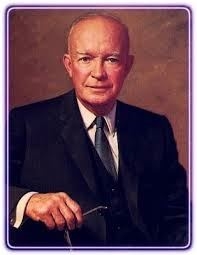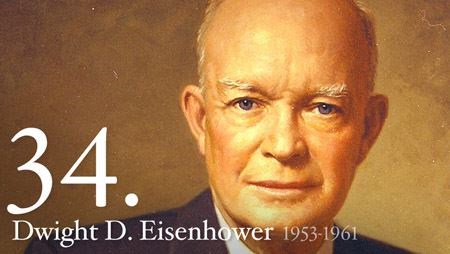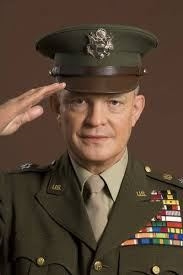 |
| (www.homeofheroes.com ()) |
"Tensions were boiling in the Allied Nations as they were waiting on word of the commencement of Operation Overlord. Weather conditions were worsening but the Nazi forces needed to be pushed out of Western Europe. On June 8, 1944, President Roosevelt was notified of the successful landing on the beaches of Normandy" (History.com). The man who led the pivotal Operation Overlord for the Allied forces was none other than Dwight D. Eisenhower. Born on October 14, 1890 in Denison, Texas, a West Point graduate, Eisenhower was a successful WWII commander and then went on to become the 34th President of the United States. Dwight D. Eisenhower ascended to these leadership roles by possessing such qualities as excellent organizational skills, the ability to command respect from his peers, and the expertise to encourage others to work together towards a common goal. Dwight D. Eisenhower was one of the greatest leaders in United States history and was a hero to many Americans, because he was the successful commander of the D-Day forces in WWII, as president he courageously worked to prevent the spread of Communism by helping end the Korean War, and used his political power to create the Interstate Highway System.
Dwight D. Eisenhower, commander of Operation Overlord, used his leadership skills to command the respect and trust from others and rally his men to successfully fight against the Nazis in World War II. Anne Commire writes about how Eisenhower makes smart decisions under pressure situations by stating, "The plan originally called for the landing of three divisions of infantry on the Normandy beaches, but Eisenhower made the crucial decision to land five divisions of American, British, and Canadian infantry along the 50-mile front.[...] Fortunately, Eisenhower never had to issue that public declaration of failure. The weather held and the landings, though difficult, were successful" (Commire). With Eisenhower's decision to increase the size of the attacking force, it proves that he can make smart decisions that are best for his people. The fact that he was able to make this decision with the permission from the Allied leaders also proves that he is a great leader. In the article "D-Day: the unparalleled allied invasion that marked the beginning of the end for Adolf Hitler", it states that Eisenhower could encourage his men to work together. "The result of unprecedented cooperation between the United States and the Allied nations fighting in Europe in World War II, D-Day represented a renewed commitment to defeat Nazi Germany" (American History). Eisenhower's leaderships skills show how he can command the respect of others. He then could encourage his troops to rally together and fight against the Nazis. Operation Overlord was a crucial operation and Eisenhower's tactile decisions were executed to perfection giving the Allies the victory.
 |
| (bookstore.gpo.gov ()) |
Shortly after being elected President, Eisenhower helped negotiate an armistice which ended the Korean War and ultimately helped prevent the spread of Communism. Anne Commire, discussing the topic of the Korean War, writes about the implications of the war if an armistice was signed. She goes on to argue, "Eisenhower and his secretary of state, John Foster Dulles, successfully ended the Korean War in 1953, which had started in June 1950 when North Korea invaded South Korea, and subsequently prevented war from erupting in both Asia and Europe" (Commire). The Korean War had the potential to become far worse than what it already was and could spread into Communist China and parts of Europe. Eisenhower knew that the best thing to do was find peace as quickly as possible before matters got worse. The New York Times points out a statistic that shows how Eisenhower did what he could to protect his people by commenting, "After Eisenhower made peace in Korea, not one American serviceman was killed in action during the remaining seven and a half years of his presidency. No American president since Ike can make that claim" (The New York Times). This statistic just proves how much Eisenhower loved his country. He ended the Korean War early on in his presidency and kept the US out of conflict. He did what was best for his country every chance that he could. Signing the armistice to end the Korean War did not only stop the fighting in Korea but stalled the spread of Communism.
Arguably one of the most important accomplishments in Eisenhower's presidency was the Interstate Highway system which benefited everyone in America. The U.S. Department of Transportation Federal Highway Administration explains the importance by writing, "the Interstate System has been a part of our culture as construction projects, as transportation in our daily lives, and as an integral part of the American way of life. Every citizen has been touched by it, if not directly as motorists, then indirectly because every item we buy has been on the Interstate System at some point" (FHWA). The Interstate Highway System was something that Dwight D Eisenhower really wanted to see happen. He knew it would help the population in so many ways. History.com shows how Eisenhower thought of all the reasons that the Interstate would provide safety towards his people before signing the act. They state, "that would, according to Eisenhower, eliminate unsafe roads, inefficient routes, traffic jams and all of the other things that got in the way of "speedy, safe transcontinental travel." At the same time, highway advocates argued, 'in case of atomic attack on our key cities, the road net [would] permit quick evacuation of target areas'" (History.com). As a military general, Eisenhower planned for the highways to be a safe form of transportation in case of evacuation. He didn't want old roads that were unreliable in times of need. His natural instinct of thinking to protect others is heroic. The Interstate Highway System benefited all citizens and is considered to be one of the most important things that Eisenhower had achieved in his presidency.
 |
| (d--h.info ()) |
All in all, Dwight D. Eisenhower's leadership helped him become one of the greatest Presidents ever. His contributions in World War II, signing the armistice to end the Korean War, and creating the Interstate Highway system proves that he was a selfless and genuine American Hero. Overall, many of Eisenhower's achievements and accomplishments were based on the good of his people. He rarely made selfish decisions that only benefited himself. He is an inspiration to anyone American who strives to become a leader, and should be looked upon as a role model that everyone should want to become. He was just a normal person who wanted to help others and serve his country. Little did he know that his leadership helped him become one of the greatest military commanders and presidents the United States has ever seen. This is why Dwight D. Eisenhower is an inspiration and hero to all.
Works Cited
"D-Day: the unparalleled allied invasion that marked the beginning of the end for Adolf Hitler." American History 49.2 (2014): 68+. Biography in Context. Web. 3 Feb. 2016
"Dwight D. Eisenhower." Historic World Leaders. Ed. Anne Commire. Detroit: Gale, 1994. Biography in Context. Web. 27 Jan. 2016.
"General Dwight D. Eisenhower Launches Operation Overlord." History.com. A&E Television Networks, 2016. Web. 02 Feb. 2016.
"How to End a War, Eisenhower's Way." 100 Days How to End a War Eisenhowers Way Comments. The New York Times, 04 Feb. 0840. Web. 04 Feb. 2016.
"Highway History." History of the Interstate Highway System. U.S. Department of Transportation Federal Highway Administration, 18 Nov. 2015. Web. 29 Jan. 2016.
"The Interstate Highway System." History.com. A&E Television Networks, 2010. Web. 04 Feb. 2016.
Page created on 2/12/2016 12:00:00 AM
Last edited 2/12/2016 12:00:00 AM
